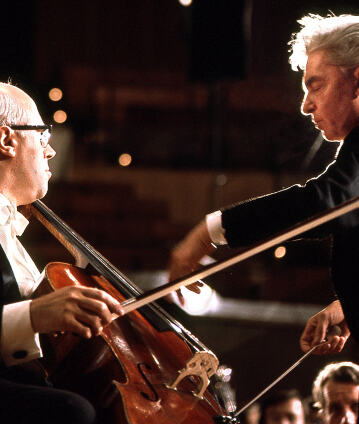Herbert von Karajan and Mstislav Rostropovich with Strauss’s “Don Quixote”

Herbert von Karajan was a great admirer of Richard Strauss and is still considered an outstanding interpreter of his music. With Karajan, the tonal splendour and virtuosity of the orchestration was in the best of hands, especially in Strauss’s tone poem Don Quixote which he held in particular high regard. In this famous recording from 1975, the solo cello, which represents the eponymous hero, is played by Mstislav Rostropovich.
During the next five decades Don Quixote remained close to the centre of Karajan’s repertory, nor was there a leading exponent of the role of Quixote whom he did not enlist to play: Mainardi, Tortelier, Fournier, Rostropovich, Ma, and in later years the young Brazilian cellist Antonio Meneses. In Berlin in 1976, he entrusted the solo role to the Berliner Philharmoniker’s own distinguished principal cellist Ottomar Borwitzky.
Among the many qualities Karajan revered in Strauss was his mastery of the musical epilogue. “They are all wonderful but for me the greatest comes at the end of Don Quixote where Quixote says, ‘I have battled and I have made mistakes but I have lived my life as best I can according to the world as I see it, and now...’ I find this intensely moving.” Such was Karajan’s attachment to the work, he often programmed it to mark moments of farewell, as in Vienna in 1964, or remembrance, as in Berlin in 1986 on the occasion of the centenary of the birth of his predecessor in Berlin, Wilhelm Furtwängler.
Karajan had a specially warm working relationship with Mstislav Rostropovich. This is how he remembered the beginning of the rehearsals for the joint performance recorded here. “At the cello’s first entry Rostropovich came in with a dreadful slow grumbling noise. I was so surprised I stopped the orchestra. ‘Slava, are you all right?’. ‘Yes, but you see, it’s a very old horse that I’m riding.’ Wonderful!”
© 1975 Unitel
Artists
Our recommendations
- Karajan conducts Beethoven’s Symphonies Nos. 1 & 4
- Karajan conducts Brahms’s “German Requiem” in Salzburg
- Herbert von Karajan and Evgeny Kissin at the 1988 New Year’s Eve Concert
- Karajan and Weissenberg perform Tchaikovsky and Rachmaninov
- Karajan conducts the 1978 New Year’s Eve Concert
- Performance and conversation: Karajan conducts Dvořák’s Symphony No. 9